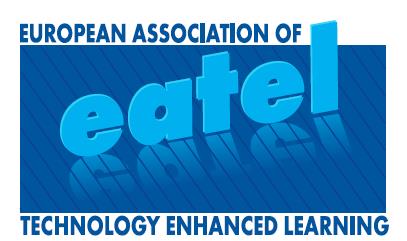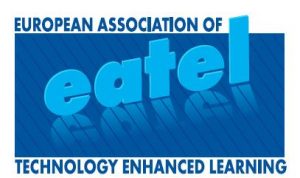
The 13th European Conference on Technology-Enhanced Learning (EC-TEL 2018)
The 13th European Conference on Technology-Enhanced Learning
3-6th September 2018, Leeds, United Kingdom
We live in an increasingly digital and globalized world that offers great opportunities for information sharing and the generation of new knowledge. This reality has enabled us to move forward rapidly as a society in many respects, but has also led us to complex, diverse and interdisciplinary challenges that affect all areas of knowledge such as health, demographic change and wellbeing; food security and bioeconomy; secure and clean energy; smart and green energy; or climate action and environment – to name just a few that are emphasised by the European Union.
In order to meet these major challenges, we need to build a society that enhances the development of 21st century skills in lifelong learning. 21st century skills encompass not only technical and domain-specific skills, but also domain-independent meta-skills such as the 4Cs: critical thinking, creativity, communication, and collaboration; all needed to manage the complexity of future problems. On the other hand, dealing with the complexity and uncertainty of tomorrow’s problems requires citizens capable of developing their knowledge throughout their lives. In this context, technology can play a key role in generating new learning environments that support learners across both formal and informal learning contexts, facilitating them in developing and practising 21st century skills to face the challenges of the future.
This year, the European Conference on Technology-Enhanced Learning (EC-TEL) aims at engaging researchers, practitioners, educational developers, entrepreneurs and policy makers in a joint discussion on how to put science, technology and practice at the service of learning to embrace these challenges on the topic: “Lifelong technology enhanced learning: Dealing with the complexity of 21st century challenges”. We are looking forward to contributions to feed the debate around this topic on many levels; to discuss and demonstrate how both lifelong learning and technology are indeed a solution to deal with future uncertainty and 21st century challenges. We also encourage participants to extend the debate around the role of and challenges for cutting edge 21st century technologies and advances such as artificial intelligence and robots, augmented reality and ubiquitous computing technologies for learning. We welcome papers reflecting on practices and different pedagogical approaches, types of learning settings, and application domains that can benefit from such technologies.
Theoretical and conceptual papers, as well as small-scale and large-scale empirical studies are welcome. Moreover, we encourage participants to conduct their scientific inquiry using emerging best practices from open science detailed in this call for papers.
Venue and Co-location with MEI2018
===
The venue for this year’s conference is Leeds, a vibrant, modern city and an important academic and economic centre. Leeds attracts visitors for its world class culture, heritage, arts, shopping, food & drink, as well as beautiful countryside and a lively nightlife. Highlights include the Yorkshire Dales, Yorkshire Sculpture Triangle, Royal Armouries Museum and the World Heritage Site of Saltaire. The University of Leeds will be hosting both EC-TEL 2018 (3rd-6th September) and Medical Education Informatics (6th-7th September) and we anticipate a lively exchange between the two co-located conferences, based on shared research and practice interests. To support this EC-TEL2018 will include a TEL in Healthcare Education stream within the conference itself.
Statement on Open Science
===
This year, and following the lead of other conferences of the community, we want to contribute to the Open Science movement to promote reproducible and verifiable research. With this aim, we encourage participants to conduct their scientific inquiry using Open Science best practices. Here you have some of the best practices you can think about:
Pre-registration. Results from experimental interventions are more robust when researchers predefine an experimental plan and register it. To do so, we encourage authors to have a look at different organizations such as the Open Science Framework, where you can report pre-registered and exploratory analyses to be reviewed by other researchers before running your intervention.
Share your data and analysis for replication. Sharing data sources (always anonymized!) as well as the scripts or programs you used to analyze them can help other researchers to replicate or extend your analysis. We encourage authors to share this information through personal web-pages or specialized Web-based platforms such as LearnSphere, Zenodo, Figshare.
Important Dates
===
Full Papers, Short Papers, Posters & Demonstrations:
• 15 April 2018 – Mandatory submission of an abstract
• 29 April 2018 – Submission of full version
• 27 May 2018 – Notification of acceptance
• 24 June 2018 – Camera-ready versions
Workshop Proposals
• 8 April 2018 – Submission of workshop proposal (Abstract not needed)
• 6 May 2018 – Workshops notification
• 3rd and 4th September 2018 – Workshops, Leeds
Project Meetings
• 24 June 2018 – Room reservation for project meetings
• 3rd, 4th & 7th September 2018 – Project Meetings
Conference
• 24 July 2018 – Early-bird registration ends
• 3rd and 4th September 2018 – Workshops, Leeds
• 5th and 6th September 2018 – Main conference, Leeds
Doctoral Consortium
• 22 May 2018 – Doctoral Consortium application submission
• 19 June 2018 – Doctoral Consortium application notification
• 31 July 2018 – Doctoral Consortium reviews
• 28 August 2018 – Doctoral Consortium camera-ready versions
• 3rd September 2018 – Doctoral Consortium
* All submission deadlines are 11:59pm UTC-12
Submission Formats
===
Paper submissions will be handled through EasyChair (https://easychair.org/conferences/?conf=ectel2018). All papers will be reviewed through a ***double blind*** review process. Accepted papers will be published in the conference proceedings. As every year, we will publish proceedings within Springer “Lecture Notes in Computer Science” (LNCS) Series”. The use of supplied template is mandatory: http://www.springer.com/computer/lncs?SGWID=0-164-6-793341-0
• Full Papers: max. 14 pages (published in proceedings)
• Short Papers: max. 6 pages (published in proceeding)
• Demonstration Papers: max. 4 pages (published in proceedings) plus max. 2 additionals pages describing the demo (not published in proceedings)
• Poster Papers: max. 4 pages (published in proceedings)
• Workshop proposals: submitted via online form, (not published in proceedings)
Page limits include references and appendices.
Conference Organization
===
General Chair:
Hendrik Drachsler
German Institute for International Educational Research
Goethe University Frankfurt am Main, Germany
Open University of the Netherlands
Programme Chairs:
Viktoria Pammer-Schindler, Technische Universität Graz and Know-Center, Austria
Mar Pérez-Sanagustín, Pontificia Universidad Católica de Chile, Chile
Workshop Chairs:
Julien Broisin, University of Toulouse, France
Neil Morris, University of Leeds, UK
Poster and Demonstration Chairs:
Raymond Elferink, RayCom BV, The Netherlands
Maren Scheffel, Open University of the Netherlands
Dissemination Chair:
Mikhail Fominykh, Independent researcher
Doctoral Consortium Chairs:
Christian Glahn, University of Applied Sciences HTW Chur, Switzerland
Lone Dirckinck-Holmfeld, Aalborg University, Denmark
Local Organization Chair:
Tamsin Treasure-Jones, University of Leeds, UK
Industry Chairs:
Vania Dimitrova, University of Leeds, UK
Lucia Pannese, imaginary, Italy
Healthcare Education Chair:
Gareth Frith, Institute of Medical Education (LIME), Leeds, UK
Suzanne Bickerdike, Institute of Medical Education (LIME), Leeds, UK
Steering Committee Representative:
Ralf Klamma, RWTH Aachen University, Germany
